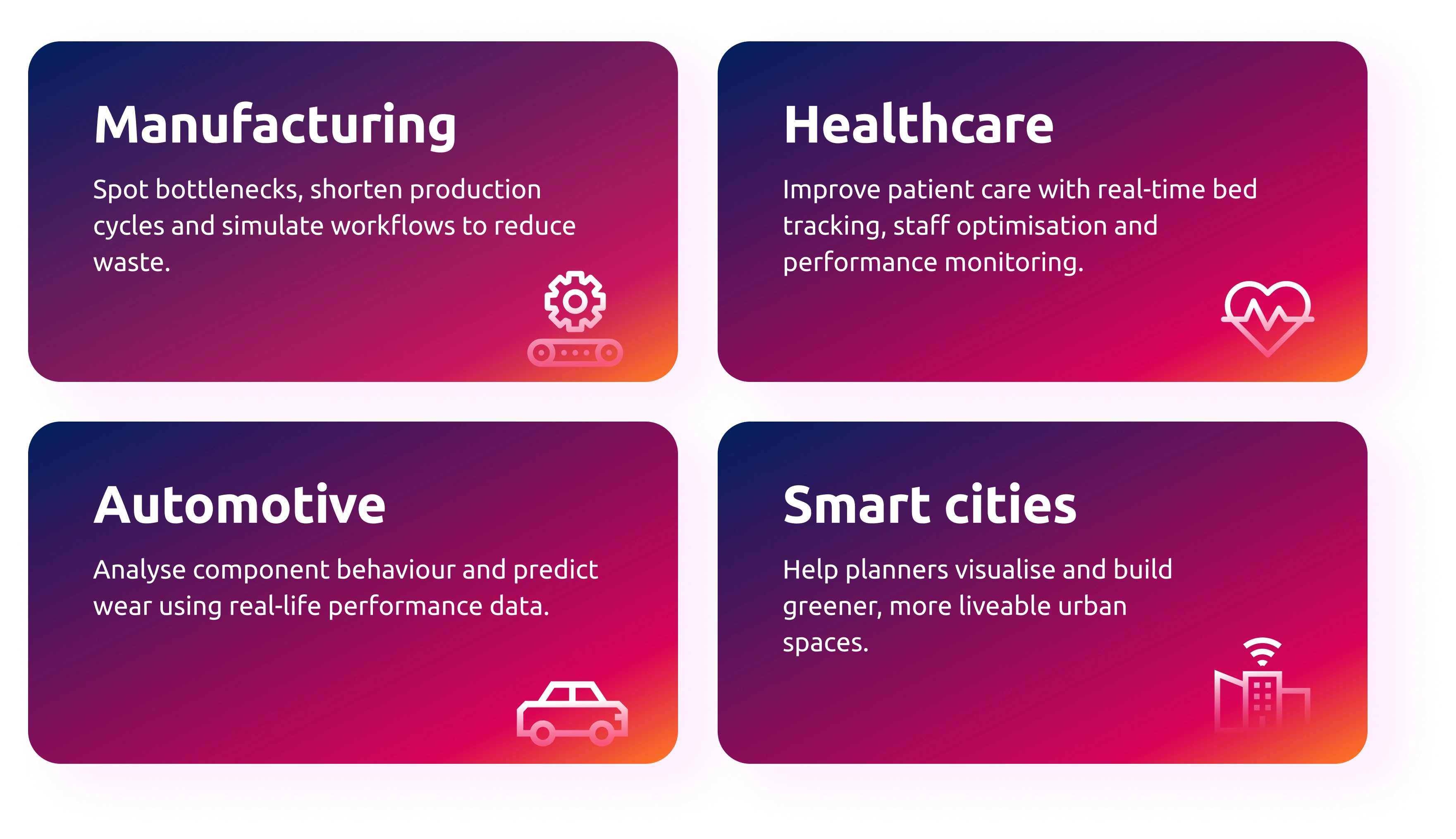Published: Jul 08, 2025
Test every decision before it hits the real world
NCS Digital Twin helps you build a virtual version of your real-world operations, such as a factory floor, hospital system or city’s transport network. It copies what’s happening in your physical environment, so you can test changes, explore what-if scenarios and make better decisions before doing anything in real life.
By combining real-time data, predictive AI and adaptive analytics in a closed-loop feedback model, the Digital Twin does not just reflect what’s happening; it uncovers why, anticipates what could happen next and recommends how to respond. With intuitive 3D visualisation layered on top, it empowers organisations to reduce risk, boost performance and plan confidently for the future.
What’s now? What if? What’s next?
The NCS Digital Twin accelerator uses a cloud-based platform to:
• Show what’s happening now in real-time
• Simulate what-if scenarios to test before you implement
• Predict future outcomes to improve uptime, safety and service quality
All of this is integrated into your core enterprise systems for smarter decision-making at scale.
Fully connected intelligence, from devices to dashboards
Our decades of systems integration experience make it easy to bring your assets online and gain full visibility fast:
- Universal connectivity
APIs that connect a broad range of sensors and devices, with support for multiple protocols. - Low-code customisation
Build operational dashboards with drag-and-drop tools tailored to your needs. - Ready-to-run apps
15+ pre-built applications accelerate insights into AI workflows, visualisation and remote control.
Backed by over 100 data scientists, our AI models turn your operational data into action.
See it. Simulate it. Optimise it.
Digital Twin adds value across sectors that manage large-scale or high-stakes systems:
 No matter how complex your operations, Digital Twin helps you validate plans and execute with clarity.
No matter how complex your operations, Digital Twin helps you validate plans and execute with clarity.
Smart factory, smarter robotics
Challenge
A smart factory needed to coordinate robots with cognitive functions that required ultra-low latency and edge computing.
Solution
We built a 3D digital replica of the factory, then deployed a robotic workforce management platform for real-time mission planning, tele-operations and orchestration enabled by 5G and edge AI.
Outcome
- Improved productivity with autonomous robots
- Flexible reconfiguration of tasks and skills
- Faster diagnosis and response in live operations
By simulating complex production before deployment, the factory achieved new levels of performance and control.
Predicting water quality with digital twin technology
Challenge
Melbourne Water needed a more sustainable way to meet rising water demand using Class A recycled water. However, sudden spikes in water turbidity disrupted production, with little to no warning for operations teams or customers, impacting supply reliability and service communications.
Solution
NCS developed a cloud-based digital twin that models Melbourne Water’s end-to-end recycled water production process. Aggregating data from over 700 system tags and integrating machine learning and predictive analytics, the solution forecasts disruptions up to 72 hours in advance, giving operations teams time to react and adjust water flows as needed.
Outcome
With up to 80% prediction accuracy, the digital twin provides a three-day early warning of turbidity issues. This helps Melbourne Water maintain a consistent, low-carbon water supply for 5 million residents while reducing operational risk and improving transparency with customers.
Bridging distances with a digital twin and generative AI
Challenge
A leading aged care provider faced a growing concern among families: Relatives struggled to stay connected with their loved ones due to physical distances and limited communication channels. Care updates were infrequent, often requiring calls to staff that went unanswered during peak hours. This lack of transparency caused anxiety and reduced trust.
Solution
To address this, we deployed a digital twin of the care facility’s IT and operational systems. The twin integrates multiple real-time data sources, ranging from movement and activity sensors to scheduling and visitor logs, into a single, intuitive interface.
Alongside this, a generative AI assistant was developed to generate daily well-being summaries for each resident automatically. These human-readable updates allowed relatives to understand care activities without needing to interpret complex medical records.
Outcome
- Over 500 data points integrated across systems.
- Real-time alerts and daily dashboards are accessible to families.
- AI-generated reports improved communication transparency.
- Reduced operational overhead on care staff.
- Stronger peace of mind for families, with better visibility into their loved ones’ well-being.
This pilot demonstrated how NCS’ Digital Twin and AI technologies can humanise care, strengthen trust and enhance operational transparency, especially in environments where emotional connection matters as much as clinical performance.